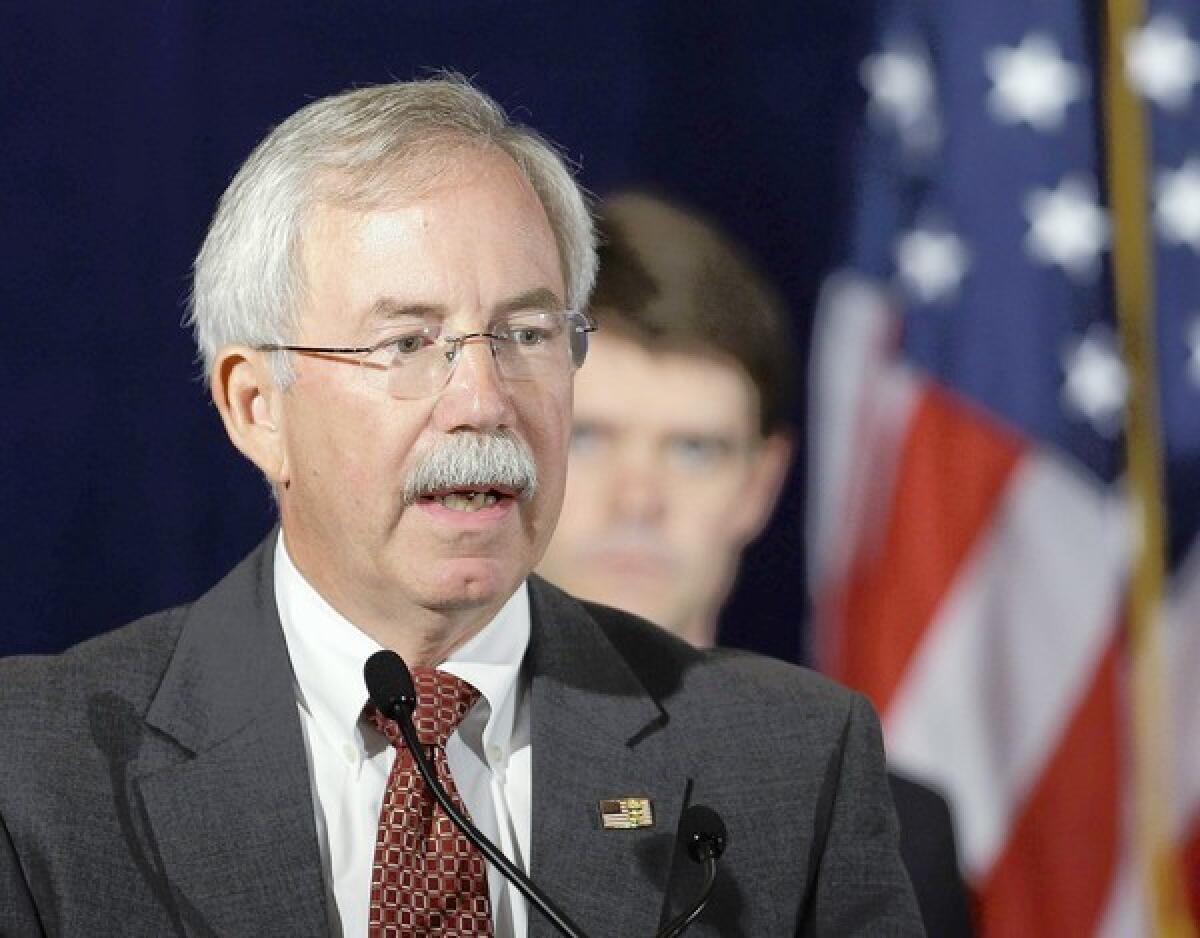More U.S. agencies implicated in Mexico gun-trafficking probe

- Share via
Reporting from Washington — The embattled head of the federal Bureau of Alcohol, Tobacco, Firearms and Explosives has told congressional investigators that some Mexican drug cartel figures targeted by his agency in a gun-trafficking investigation were paid informants for the FBI and Drug Enforcement Administration.
Kenneth E. Melson, ATF’s acting director, has been under pressure to resign after the agency allowed guns to be purchased in the United States in hopes they would be traced to cartel leaders. Under the gun-trafficking operation known as Fast and Furious, the ATF lost track of the guns, and many were found at the scene of crimes in Mexico, as well as two that were recovered near Nogales, Ariz., where a U.S. Border Patrol agent was killed.
In two days of meetings with congressional investigators over the weekend, Melson said the FBI and DEA kept the ATF “in the dark” about their relationships with the cartel informants. If ATF agents had known of the relationships, the agency might have ended the investigation much earlier, he said.
As a result of Melson’s statements, “our investigation has clearly expanded,” a source close to the congressional investigation said Wednesday, speaking on the condition of anonymity because the inquiry is ongoing. “We know now it was not something limited to just a small group of ATF agents in Arizona.”
“This whole misguided operation might have been cut short if not for catastrophic failures to share key information,” Rep. Darrell Issa (R-Vista) and Sen. Charles E. Grassley (R-Iowa) told Atty. Gen. Eric H. Holder Jr. in a letter Tuesday.
Ronald Welch, assistant attorney general for legislative affairs, responded that Justice Department officials were still discussing how to provide any “sensitive law enforcement information” regarding the FBI and DEA to congressional investigators. Without specifically acknowledging that cartel leaders were paid informants, he said their main focus is “how best to protect ongoing investigations.”
“Like you,” he told Issa and Grassley on Wednesday, “the department is deeply interested in understanding the facts surrounding Operation Fast and Furious.”
Mexican authorities have long complained that most of the guns that fuel the drug wars there are purchased in the U.S.
On Wednesday, Mexican federal police released a videotaped interrogation with recently captured Jesus Rejon Aguilar, an alleged founder of the Zetas gang who is wanted in the slaying of a U.S. immigration agent in Mexico. He brazenly told them that “all the weapons are bought in the United States” and that “even the American government itself was selling the weapons.”
He added, “Whatever you want, you can get.”
Issa and Grassley said Melson “was candid in admitting mistakes that his agency made.”
They said he told them he reviewed hundreds of documents about Fast and Furious, and became “sick to his stomach when he obtained those documents and learned the full story.”
Melson said ATF agents had witnessed the transfer of weapons from straw purchasers to others “without following the guns any further,” contradicting statements by the Justice Department.
Sources both on Capitol Hill and at the ATF said Melson did not volunteer the information about the FBI and DEA informants. Rather, they said, he “corroborated” it when congressional investigators told him other sources have said the FBI and DEA had a role in Fast and Furious lasting for months.
Issa and Grassley were clearly upset by the revelation.
“The evidence we have gathered raises the disturbing possibility that the Justice Department not only allowed criminals to smuggle weapons but that taxpayer dollars from other agencies may have financed those engaging in such activities,” they said in their letter to Holder. “According to Acting Director Melson, he became aware of this startling possibility only after the murder of Border Patrol Agent Brian Terry and the indictments of the straw purchasers.”
Terry was killed when a gun battle erupted in December along a smuggling route in Arizona near the border with Mexico.
Melson’s attorney, Richard Cullen, a former federal prosecutor and state attorney general in Virginia, declined to elaborate in an interview Wednesday except to say that the letter accurately reflects Melson’s comments to the investigators.
Cullen said Melson volunteered to speak with the committee because “he was anxious to get the facts out about the program.” He added that no one “in the leadership” at the Justice Department has told Melson to resign.
“He just wants the facts to be known by people in authority,” Cullen said. “He’s eager to be as cooperative in any official inquiry as he possibly can.”
Sources said investigators had “very real indications from several sources” that some of the cartel leaders the ATF was trying to identify through Fast and Furious were “already known” to the other agencies and apparently had “been paid as informants.”
Finally, Melson said, ATF agents along the U.S.-Mexico border realized that the FBI and DEA were running separate operations and that it “could have a material impact on Fast and Furious.” Melson said he notified his superiors of this problem in April.
The congressional leaders also noted the pressure Melson has felt to resign, and they warned Holder not to make Melson the sole “fall guy” in Fast and Furious.
More to Read
Sign up for Essential California
The most important California stories and recommendations in your inbox every morning.
You may occasionally receive promotional content from the Los Angeles Times.











